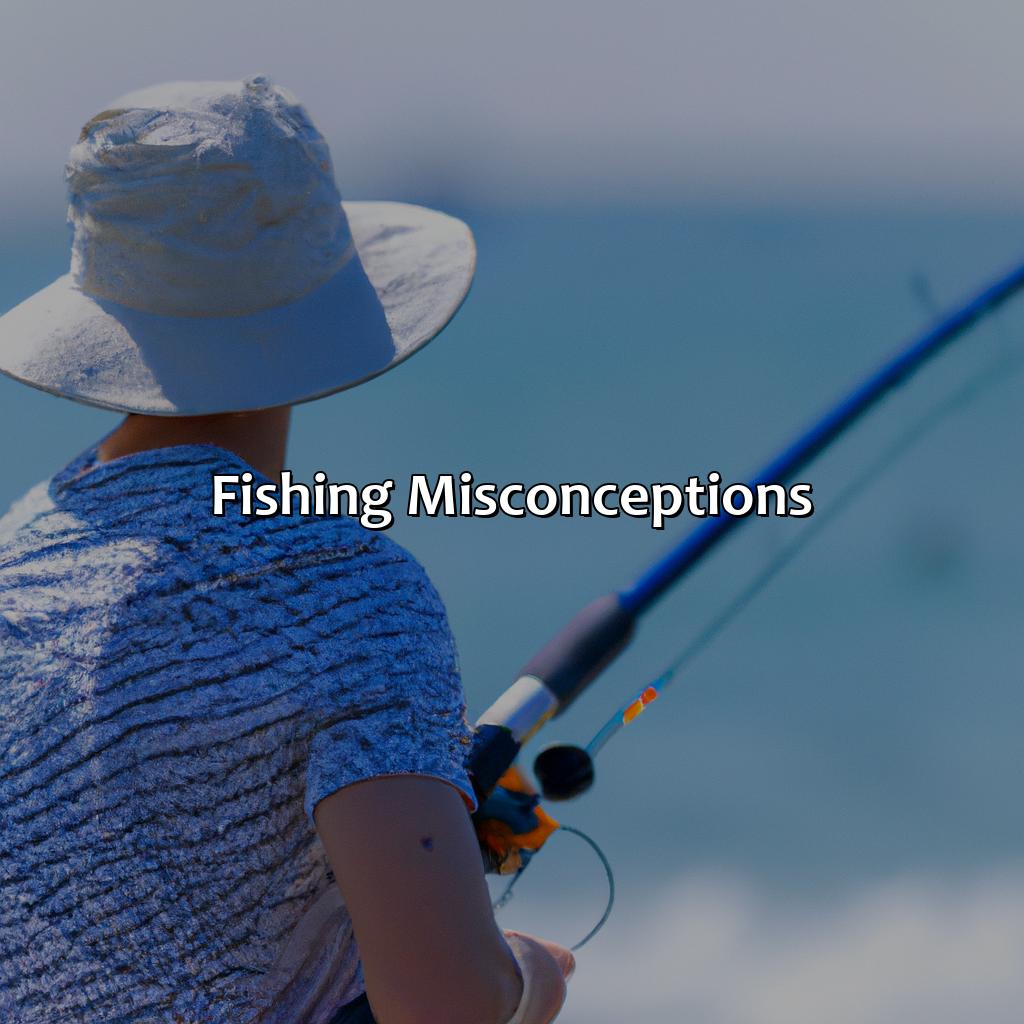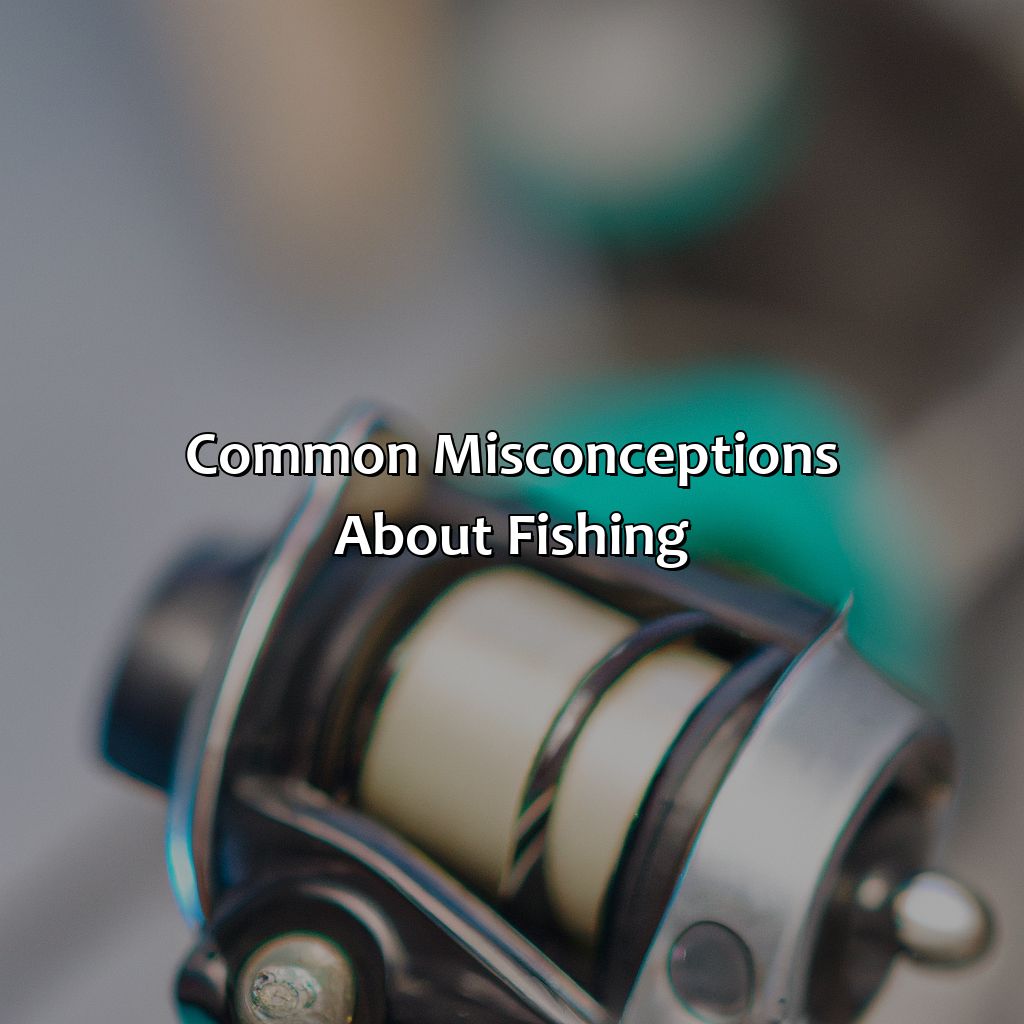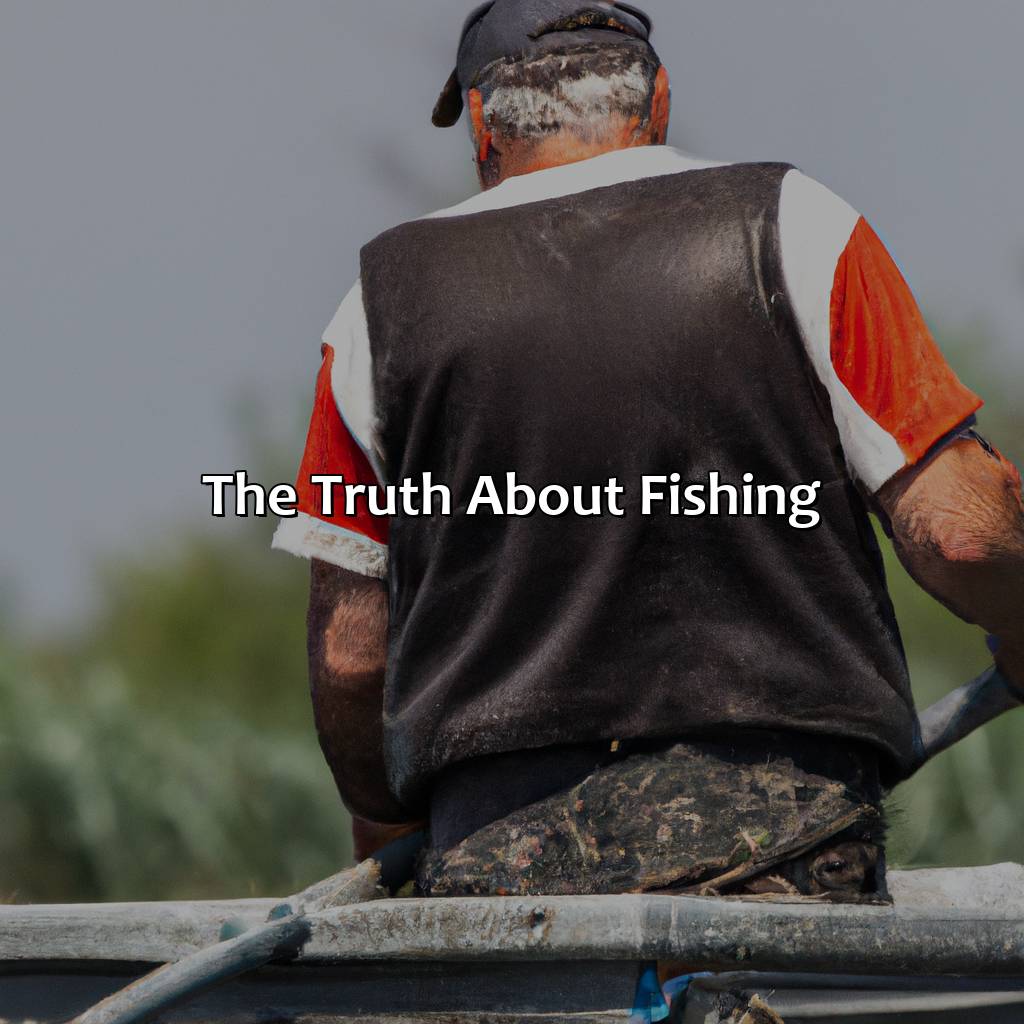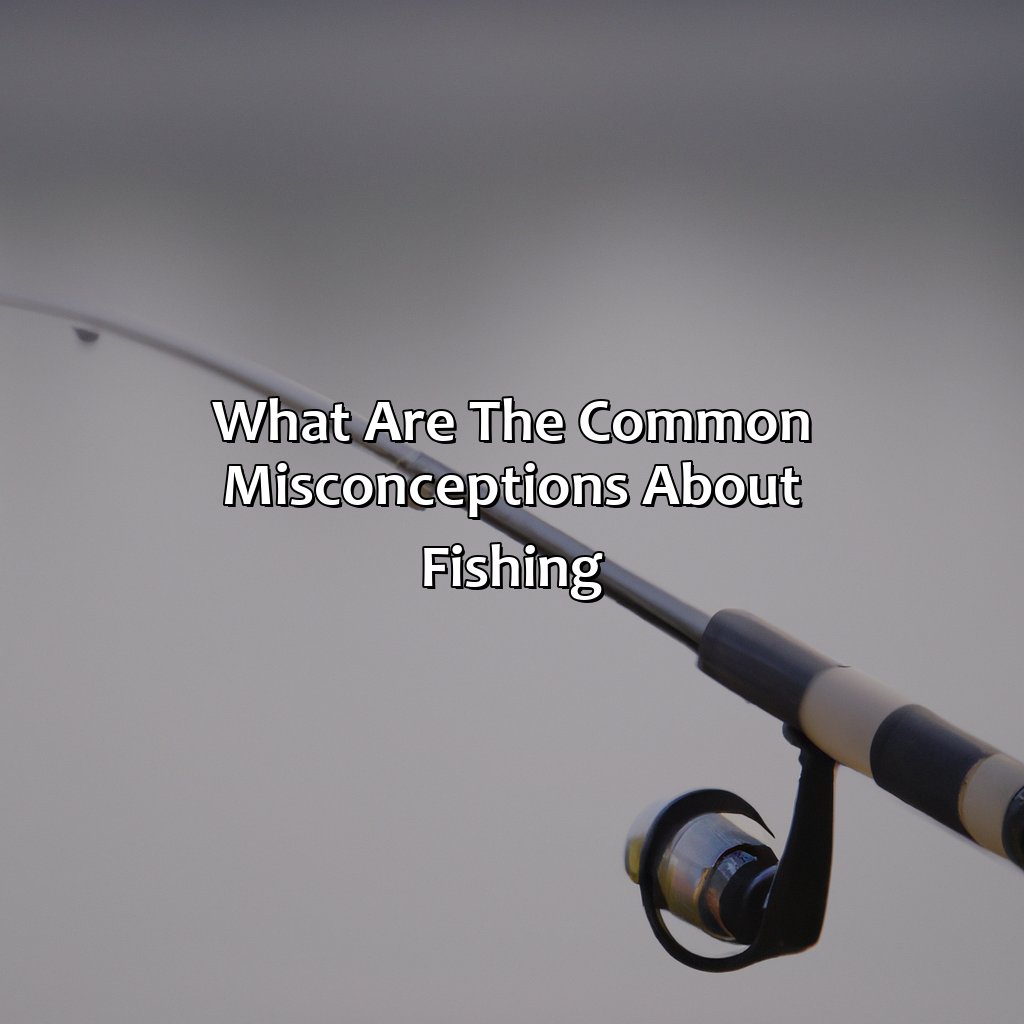Key Takeaway:
- Fishing misconceptions abound: From fishing stereotypes to mistaken ideas about fishing gear and techniques, there are many myths surrounding the sport that can discourage people from trying it out.
- Angling is for everyone: Contrary to popular belief, fishing is not just for men, and it can be an accessible and inclusive hobby for people of all ages and backgrounds.
- Fishing is an exciting and rewarding pastime: Despite common misconceptions, fishing can offer a fulfilling leisure activity, and with the right gear, techniques, and attitude, anyone can enjoy the benefits of the sport.
Fishing Misconceptions

Photo Credits: anglinginsight.com by Roger Martin
Fishing misconceptions are widespread and can lead to poor fishing experiences. One of the most common fishing myths is that bigger fish require bigger bait, which is entirely untrue. Another fishing fallacy is that fishing only requires patience; in reality, it takes skill and knowledge to catch fish consistently. A fishing false belief is that catching fish is the only measure of a successful trip; the scenery and the overall experience are just as important. Additionally, fishing mistaken ideas include thinking that fishing gear does not require regular maintenance. Proper cleaning and storage of fishing equipment is essential to ensure longevity and reliability.
Not using the right fishing gear can result in a poor catch, leading to another fishing myth that more expensive gear results in more fish caught. However, catching fish depends on the angler’s skill and knowledge, rather than on the equipment’s price. A fishing misconception that affects ecology is that fish stocks are infinite. Overfishing can negatively impact the environment by decreasing fish populations and affecting the food chain.
According to the Food and Agriculture Organization of the United Nations, more than 56 million people engaged in fishing, and the industry provided over 200 million jobs worldwide in 2020.
Common Misconceptions about Fishing

Photo Credits: anglinginsight.com by Jason Green
Do you want to understand fishing misconceptions? Here’s a crash-course! Sub-sections include:
- Fishing stereotypes
- Expensive gear
- Boring activity
- Small catches
- Harmful catch & release practices
- Patience needed for success
Happy angling!
Fishing is only for Men
Fishing Stereotypes Debunked: Exploring the Gender Divide in Fishing
Contrary to popular belief, fishing is not exclusively a male activity. The stereotype of men being the primary anglers is outdated and untrue. While it may have been more prevalent in the past, today, women are also actively exploring and enjoying the sport of fishing.
Gender should never be a barrier when it comes to pursuing one’s passion. Fishing is a recreational activity that doesn’t discriminate based on gender, age or background. Anyone who wants to try their hand at it deserves an opportunity.
Apart from breaking stereotypical thinking on gender roles within fishing communities, this is a significant step towards encouraging inclusiveness and accessibility to outdoor activities for everyone.
Historically, women’s rights had limited access to various leisure activities including fishing due to societal expectations and lack of representation in media (like movies). However, within modern times many organizations are pushing efforts to include more females in fishing programs through various initiatives and education campaigns. It’s impressive how these efforts are helping in promoting healthy participation across both sexes.
In essence, there aren’t any gender-exclusive or -inclusive aspects we could isolate within the sport of fishing anymore. It is time everybody picked up a rod and reel and explore what nature has to offer us by debunking all those stereotypes that have been proven false!
Fishing isn’t about the cost of your equipment, it’s about the size of your catch (and your lies about it).
You Need Expensive Gear to Fish
Fishing on a budget is an achievable feat, contrary to the misconception that you need to purchase expensive gear. Affordability of fishing equipment has increased substantially. Sourcing quality equipment for a reasonable price can be done online or in store, and often cheaper second hand options are available.
In addition, the cost of entry into fishing has decreased as well with more states offering free fishing days. This provides an opportunity to learn how to fish and catch without breaking the bank. Learning from friends or family members who enjoy fishing is also a great way to start building the skills required leverage your money.
To make this happen, it’s important for beginners starting out to do their due diligence by researching options like affordable used equipment or exploring low-cost alternatives. Buying gently used equipment enables them to get professional-grade tools at prices they can afford.
With patience and research, many price-conscious anglers have been able to snag big fish without spending all their savings on gear. So individuals wanting to try their hand at fishing, should not let the cost of entry discourage them from participating in a fantastic outdoor sport.
Fishing may seem boring to some, but that’s just because they haven’t experienced the thrill of reeling in a huge catch yet.
Fishing is Boring
Many people have a perception of fishing as tedious and dull. However, this is far from the truth. Fishing can be an enjoyable leisure activity that helps you bond with nature and disconnect from the mundane world.
When fishing, you don’t just sit there waiting for fish to bite. You can explore different areas, try new techniques and engage in conversations with fellow anglers. Effortlessly perfecting your skills is a great self-rewarding experience that keeps your mind active while fishing.
Additionally, modern technology has made fishing more accessible than ever before. With affordable tools, catching larger fish is now instantly gratifying. It’s also become increasingly popular among women who enjoy recreational fishing as much or even more than men.
Overall, fishing challenges your patience and focus while pushing you to understand marine biology better. Despite common misconceptions about it being boring, fishing offers a lot of fun both alone or in groups.
According to Outdoor Life magazine, “there are 45 million anglers in America, making it one of the country’s most popular pastimes.” Don’t believe anyone who says you can’t catch big fish while fishing, they just haven’t learned the right skills or found the right place to cast their line.
You Only Catch Small Fish
It’s a common misconception that fishing only leads to catching small fish.
However, the truth is that there are many different species of fish to target while fishing. Depending on the size of the water body and location, one can often catch larger fish like trout, bass, and even muskies.
Fishing size is not only determined by targeted species but also fishing techniques used while catching them. For instance, using live bait for catfish or walleye could result in a larger fish being caught rather than using lures that may attract smaller fish.
To maximize fishing success, one must understand the habits and preferences of different species throughout various seasons. Certain techniques have been developed for each species and learning these skills can improve chances of catching larger sized fish.
Don’t miss out on the opportunity to catch a larger sized fish as it can be an exciting experience! Start by exploring smaller local ponds or lakes which tend to house bigger-sized fishes, either alone or with friends.
Catch and Release might not harm fish, but it definitely hurts their egos.
Catch and Release is Harmful to Fish
Catch and Release: Is it Safe for Fish?
Catch and release is a common practice among anglers who prioritize fishing conservation and fish safety. However, there is a misconception that catch and release is harmful to fish. In reality, if done properly, catch and release is safe for the fish.
During the catch and release process, it’s crucial to minimize handling time to reduce stress on the fish. Anglers should use barbless hooks or pinch down barbs to make hook removal easier without causing further damage. Wet hands or using rubberized nets can also prevent damage to the fish’s protective slime layer. Additionally, anglers should avoid overplaying or fighting the fish to exhaustion as this can lead to internal injuries that may not be immediately visible.
Furthermore, while catch and release does pose some risks to the fish, studies have shown that survival rates can be high with proper techniques. For example, in cold water conditions where fish are more susceptible to stress, using a combination of quick hook removal and holding them upright in the water can help ensure their safety.
In summary, while it’s important to prioritize fishing conservation and fish safety during any angling activity, catch and release is safe when done properly. By minimizing handling time, reducing gear damage potential, avoiding overplaying the fish, anglers can ensure successful catch-and-release practices.
Don’t miss out on these important tips for preserving our natural resources! Incorporating these skills into your angling experiences will not only benefit the environment but also enhance your overall satisfaction in fishing. Fishing may require patience, but with the right skills and techniques, you’ll be reeling in those big catches in no time.
You Need to be Patient to be a Good Fisher
Patience is said to be a virtue, but is patience the only thing one needs to be a good fisherman? Patience is essential in fishing, but it is not the only thing that determines one’s success. Fishing requires skills and techniques that can be learned, making experience and dedication more critical factors than just patience.
When it comes to fishing, having patience means allowing time for your catch to bite your bait. However, knowing how to choose the right bait, where to cast your line, and how to work your rod are equally important. Excellent fishing skills such as identifying the right location depending on the type of fish species; using specific bait matching fish preferences and times of year among others are essential factors that attribute to higher chances of success.
In addition to honing fishing skills with practice, perseverance is vital when waiting for a catch. Sometimes it may take hours without catching anything, but true fishermen know that their patience will pay off eventually. It can also provide an opportunity for solitude and relaxation while enjoying nature around you.
A seasoned angler I know strolled along the shore with his grandkid teaching him some complicated knots they use in catching different species of fish with various lines. For years he has mastered being patient enough not only in waiting for his catch but also in sharing knowledge among family members and friends who have shown interest in the sport.
“Reel in the benefits of fishing – it’s not just about the catch, but also the stress-relief and relaxation it provides.”
The Truth about Fishing

Photo Credits: anglinginsight.com by Benjamin Campbell
To uncover the realness of fishing and its advantages, the article “What are the common misconceptions about fishing?” has a section called “The Truth about Fishing”. It has sub-sections like:
- “Anyone Can Fish” which highlights inclusivity.
- “Fishing Gear can be Affordable” which emphasizes budget limits.
- “Fishing can be Exciting and Fun” which talks about the fun factor.
- “You Can Catch Big Fish” which discusses success in the sport.
- “Catch and Release is Safe for Fish” which focuses on fish safety.
- “Skills and Techniques can be Learned to Improve Fishing Success” which brings up the educational side.
Anyone can Fish
Fishing is a universal activity with high accessibility and inclusivity. The sport can be enjoyed by anyone, regardless of age, gender, or physical ability. With the right gear and equipment, even the most inexperienced anglers can experience the thrill of landing a fish.
An important factor contributing to fishing accessibility is the availability of affordable fishing gear. Contrary to popular misconception, expensive equipment is not a prerequisite for successful angling. In fact, simple tackle and basic techniques may be sufficient for catching many species of fish.
Fishing preconceptions often depict it as a boring pastime that requires an abundance of patience. However, fishing can provide an exciting adventure for those who enjoy being outdoors and exploring new environments. Whether it’s freshwater or saltwater fishing, there are numerous challenges that await anglers.
Another myth associated with fishing is that small fish are all that can be caught. Anglers routinely land large game fish such as tuna, marlin, and sailfish on their lines. The correct gear selection and development of skills and knowledge increase the chances of catching large specimens.
Catch and release might seem harmful to fish, but practices through scientific approaches have shown this method to be safe for both microbial life in water bodies and aquatic life. Anglers should learn proper handling methods as well.
Pro Tip: Participating in local workshop or angling clubs help develop fishing skills while providing an opportunity to meet other enthusiastic anglers.
Don’t let your fishing budget sink like a stone – affordable gear can hook you a big catch!
Fishing Gear can be Affordable
For those who are interested in fishing but think it’s an expensive hobby, there is good news. Fishing gear can be cost-effective and affordable when you know where to look. You do not need to spend a lot of money on the latest gear to enjoy fishing as a hobby.
There are many options available for those on a fishing budget. Second-hand shops and online marketplaces often have affordable equipment for sale. Reels, rods, and lures can also be purchased individually rather than buying a full set if you’re not yet ready to commit financially.
Furthermore, taking good care of your gear extends its lifespan; this reduces the need and frequency of replacing it. With practice, knowledge about proper maintenance can be acquired over time.
Using affordable gear does not mean sacrificing quality or success in catching fish. In fact, some professionals prefer using basic equipment to develop skills and techniques while maintaining enjoyment during recreational outings.
In summary, owning cost-effective fishing gear is attainable since secondhand markets offer economical options to develop hobbies while sticking within your budget. These options allow for enjoyable recreational fishing with successful catches without breaking the bank.
A true story: Last summer I visited my old hometown for vacation. My friends planned a trip for us; we decided to go fishing at a nearby pond. I was hesitant about going since I did not own any gear and thought it would be an expensive hobby to start. However, one of my friends offered her extra set that she had recently bought from an online marketplace which was cheap but still qualitative. Although not at first, our day turned out fantastic! I ended up catching three large-sized catfish; we brought them home and barbequed them right away! It was one of the most fun-filled outings I’ve ever had without realizing affordability could enhance the satisfaction derived from hobbies like these!
Fishing is not just about being patient, it’s also about the excitement of feeling that tug on your line and reeling in your catch.
Fishing can be Exciting and Fun
Anglers worldwide know that fishing can bring immense excitement and enjoyment into their lives. The joy of hooking a big fish and the thrill of reeling it to shore can create an unforgettable experience. Furthermore, exploring different waterways and natural habitats while seeking the next catch is sure to keep any angler engaged and entertained.
Fishing has been known to provide endless excitement, from finding new fishing spots to learning about the various fish species and mastering techniques for catching them. Beyond this, there are many other benefits of fishing, including spending time with loved ones or taking some much-needed alone time in nature.
Many people think that fishing is boring or monotonous, but with so many different species of fish and methods for catching them, boredom is unlikely. There are also various ways to make the experience more enjoyable, such as listening to music or bringing along some snacks.
Whether one catches a big fish or not, the thrill of casting a line and feeling the tug on your line is sure to be both exciting and fun. With practice and patience, anyone can become proficient in catching larger fish species like bass or trout.
Who says size doesn’t matter? With the right skills and techniques, you can reel in a catch that will make even the biggest fisherman jealous.
You Can Catch Big Fish
Catching large fish while fishing is a common misconception that many people believe is not possible. However, with the right techniques and gear, you can catch big fish and achieve fishing success.
Here’s a 5-step guide to help you catch big fish:
- Choose the Right Fishing Gear: Invest in good quality fishing gear that can handle larger fish without breaking. A sturdy rod, reel, line, and hook will help you to land bigger catches.
- Know Your Species: Research the type of fish you want to catch and determine their habitat, feeding times, preferred bait, and other habits.
- Use Appropriate Bait: Select the right bait for the specific species you are targeting. Larger fish usually require bigger baits such as live bait or lures that mimic real prey.
- Cast in the Correct Location: Larger fish often lurk in deeper waters near underwater structures such as reefs or drop-offs. Fishing in spots where bigger fish are known to gather increases your chances of catching them.
- Practice Patience: Catching big fish requires patience, persistence, and skillful technique. Wait for the perfect moment to set your hook and reel in your catch using consistent pressure.
Remember that fishing size may vary depending on various factors such as fishing location and weather conditions. There is no guarantee that every fishing trip will result in catching larger fish than usual, but following these steps can increase your chances of success while demonstrating new fishing techniques.
Catching big fish adds an exciting challenge to any angler’s day out on the water. Plus, it gives a sense of fulfillment knowing one has caught something unique!
According to studies conducted by Adventure Travel Trade Association (ATTA), fishing improves mood level by reducing anxiety feelings among individuals; therefore, it could serve as a stress reliever too!
Save a fish, release your catch – fishing conservation at its best!
Catch and Release is Safe for Fish
Fish safety is crucial for fishing conservation, and catch and release is a common practice in the sport. It is important to note that when done properly, it can be safe for fish. Catching a fish correctly is vital to ensure its survival. Careful handling of the fish using equipment such as wet hands or gloves helps reduce harm to the fish.
Additionally, removing the hook safely is essential in minimizing injury, which can be done through de-hooking tools or cutting the line close to the hook. If there are injuries, they should be treated promptly with appropriate measures taken not to cause further harm.
The benefits of catch and release fishing include preserving fish populations, promoting fish growth while reducing injury and disease prevalence. Fishermen can learn these skills from conservation organizations in their area or online sources on how to handle and release fish safely.
By consistently practicing safe catch and release techniques, fishermen contribute significantly to maintaining healthy fisheries for future generations. A lack of proper emphasis on fish safety will endanger aquatic resources leading to depletion of species along with a loss of enjoyment for recreational fishing activities.
Skills and Techniques can be Learned to Improve Fishing Success
For fishing enthusiasts, there can be a lot to learn – from selecting gear to understanding proper techniques. By investing time and effort in fishing education and training, anglers can learn valuable skills and techniques to improve their success on the water.
- Learning new skills: Fishing requires practice with new skills. Try reading guides, attending classes or workshops, or joining a fishing club for helpful tips.
- Patience is key: Patience is important in fishing; it’s stressful to get too caught up in wanting immediate results.
- Reading conditions: Knowing how to interpret weather patterns and diving conditions can help fishermen make smarter decisions about where and when they fish.
- Improving casting accuracy: Practicing casting accuracy can help reduce error and thus increase the catch rate
- Making use of baits: Bait selection plays an important role in determining what fish will bite. Using different types of lures and bait to see which one works best in certain situations improves chances of success.
- Safety first: Understanding safety precautions such as wearing life jackets, checking weather conditions before going out, and knowing how to handle fish properly are all crucial aspects that need consideration.
In summary, acquiring the right fishing education, training programs or attending workshops enhances the craft greatly providing new levels of insight into proper techniques. Utilizing effective tips like having realistic expectation about the catch size with sufficient patience while studying environmental cues has seen many improve their success rates.
Fishing Education doesn’t just involve basic knowledge but includes professional training practices aimed at improving past angling performance. By taking courses centered on the different levels of technique through field studies have seen large advancements made in various areas such as safer handling of catch steadily transforming overall perceptions about recreational angling importance societal wise creating economic corridors around this sport.
Five Facts About Common Misconceptions About Fishing:
- ✅ Fishing is not just a hobby or sport, but also a means of livelihood for many people around the world. (Source: FAO)
- ✅ The belief that fishing is a male-dominated activity is a common misconception, as women play a significant role in the industry. (Source: UN Women)
- ✅ Using live bait is not necessarily more effective than using artificial lures, as both can be successful depending on the situation and species. (Source: Outdoor Life)
- ✅ Catch-and-release fishing is not always beneficial for the fish, as improper handling and hook removal can cause long-term harm or death. (Source: Science Direct)
- ✅ The misconception that fish do not feel pain has been debunked by scientific studies, indicating that they have a nervous system capable of experiencing pain and suffering. (Source: PETA)
FAQs about What Are The Common Misconceptions About Fishing?
What are the common misconceptions about fishing?
There are many misconceptions about fishing that people tend to believe. Here are some of the most common ones:
Is fishing only for men?
One of the most common misconceptions about fishing is that it’s just for men. In reality, fishing is a sport that can be enjoyed by anyone, regardless of gender.
Do you have to be patient to fish?
One misconception is that you have to be extremely patient to fish. While it does require some patience, it’s not necessary to have an extreme amount. With the right equipment and technique, one can catch fish rather quickly.
Do you need expensive equipment to fish successfully?
Another common misconception is that expensive equipment is necessary to catch fish. While higher quality equipment can be beneficial, it’s not necessary to spend a lot of money to have a successful day of fishing. Basic equipment can be just as effective when used correctly.
Is fishing harmful to the environment?
Many people believe that fishing is harmful to the environment, but this is not necessarily true. Responsible fishing practices, such as catch-and-release, can actually be beneficial to the environment and help preserve fish populations.
Is fishing boring?
Some people think that fishing is a boring activity, but this couldn’t be further from the truth. Catching a fish is an exciting and rewarding experience, and the peace and tranquility of being out on the water can be quite therapeutic.
Do you have to eat what you catch when fishing?
Finally, another common misconception is that you have to eat what you catch when fishing. In reality, catch-and-release is a popular and responsible way to enjoy fishing without having to keep and eat the fish.

